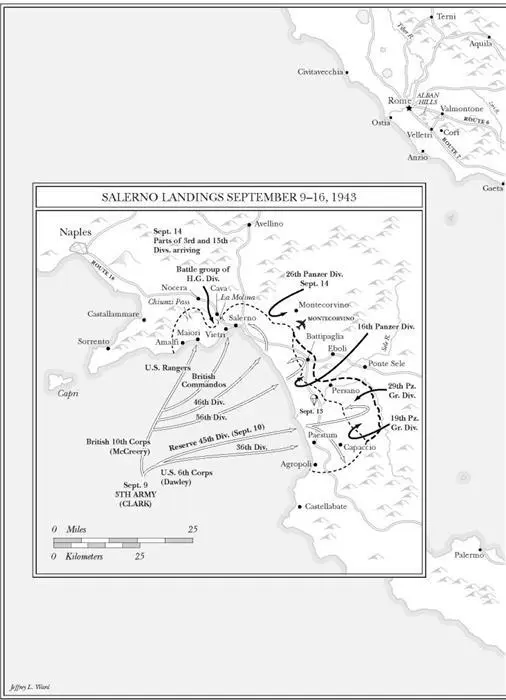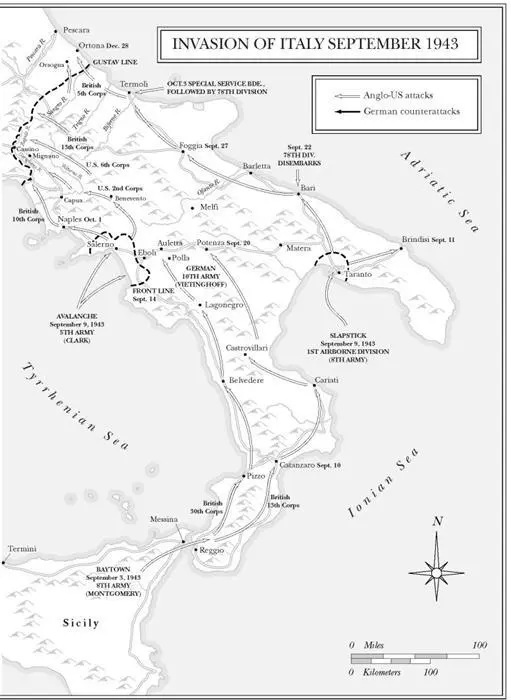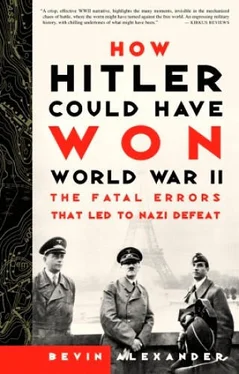Farther south unrelenting Russian attacks forced the German armies to abandon Kharkov and withdraw to a new line from Zaporozhye to the Black Sea.
In late September, Russians seized Zaporozhye, and imperiled 1st Panzer Army holding the Dnieper bend, 6th Army holding the region between the Dnieper and the Sea of Azov, and 17th Army, which Hitler had finally ordered out of the Kuban peninsula, but had sent into the Crimea.
Late in October Russians attacked 6th Army, which withdrew to the lower Dnieper between Nikopol and Berislav, thus cutting off 17th Army in the Crimea, and threatening 1st Panzer Army.
Early in November, Russian forces along the Dnieper swung west of Kiev, and took the city from the rear. They were now more than 300 miles west of Kursk.
The Germans were unable to contain these advances, but Hitler rejected a plan that might have stymied the Russians. Immediately after Citadel, Rommel devised a method that would have worked: building a heavily mined defensive line perhaps six miles deep protected by every antitank gun the Germans could find. Russian tanks would bog down before such a line, and from then on would have to gnaw their way forward. Meanwhile the Germans could build more minefields and antitank screens behind.
But Hitler would not listen. When Guderian proposed such a line, Hitler asserted that his generals would think of nothing save withdrawal if he permitted defensive positions in their rear. “He had made up his mind on this point,” Guderian wrote, “and nothing could bring him to change it.”
As the year 1943 ended on the eastern front, the German army had been pushed well west of most points it had reached at the end of 1941 but was holding this line precariously. Everyone from field marshal to private knew the Russian juggernaut was poised to drive the Germans out of the Soviet Union and beyond in 1944.
20 THE ASSAULT ON ITALY

IF THE ALLIES HAD LANDED AIRBORNE TROOPS AT ROME AND MADE A SEA LANDING nearby, Kesselring would have been forced to evacuate all of the southern half of Italy.
Indeed, many of the Germans in the six divisions of H.-G. Vietinghoff’s 10th Army in southern Italy might have had to surrender. Siegfried Westphal, Kesselring’s chief of staff, said the two German divisions around Rome were too weak to eliminate the Italian divisions there and defend against an Allied attack as well. “One could hardly bank on saving the 10th Army from being cut off,” he said. The Allies should have landed not at Salerno but at Civitavecchia, thirty miles north of Rome. “A combined sea and air landing would have taken the Italian capital inside seventy-two hours.” That would have brought all Italy south of Rome into Allied hands.
Despite Allied command of the sea, Eisenhower dared nothing so bold as a strike at Rome, because it was beyond the reach of fighter aircraft. He also ignored recommendations that the Allies land on the heel of Italy, around Taranto and Brindisi, also beyond fighter cover, but where the Germans had no troops.
Instead, Eisenhower and Alexander ordered the main thrust by General Mark Clark’s 5th Army around Salerno (Operation Avalanche) on September 9, 1943—55,000 troops in the initial landing, 115,000 more to follow.
Belatedly realizing that no Germans were anywhere close to Taranto, the Allies pulled the British 1st Airborne Division out of rest camps in Tunisia, piled the men onto warships (the only vessels now available), and hurried them to the port—with only six jeeps and no tanks, artillery, or heavy weapons. The “paras” met no resistance, but were unable to exploit their success.
Kesselring, confident the Allies would do nothing daring, concentrated his slender forces around Salerno. Vietinghoff sent just two infantry battalions to slow Montgomery’s entire 8th Army in its step-by-step march up the toe of Italy from the Strait of Messina. Only two roads ran up the toe, one on either side of the mountainous backbone of the peninsula, and they were easily blocked.
Of 10th Army’s six divisions, four had escaped from Sicily and were badly depleted in men and equipment. Vietinghoff sent the 15th Panzergrenadier and Hermann Göring Divisions to Naples to refit, the 1st Parachute Division to the east coast to defend Foggia, and the 29th Panzergrenadier Division around the toe of Italy to face Montgomery. His other two divisions were the 16th and 26th Panzer. But the 26th had no tanks and Vietinghoff sent it temporarily to block 8th Army. This left the 16th Panzer, his best force, but with only half the strength of an Allied armored division, possessing eighty Mark IV tanks and forty self-propelled assault guns. He placed it to cover the Gulf of Salerno.
The landing was made by the U.S. 6th Corps under Ernest J. (Mike) Dawley on the right, and the British 10th Corps under Sir Richard L. McCreery on the left.
McCreery’s corps landed on a seven-mile stretch of beaches just south of Salerno near the main road (Route 18) to Naples. This road crossed the low Cava Gap. Capture of that gap was important to open a way to Naples and to block German reinforcements coming from the north.
In 10th Corps were the British 46th and 56th Infantry Divisions, two British Commando outfits, and three battalions of American Rangers. The Commandos and Rangers were to seize Cava Gap and Chiunzi pass on a neighboring route.
Dawley’s corps struck the beaches twenty to twenty-five miles south of Salerno around the Sele River and Paestum. The untried U.S. 36th Infantry Division was to land, with the U.S. 45th Infantry Division in reserve.
The Allies knew the Germans were expecting the invasion at Salerno because a German radio commentator forecast it two weeks before it took place. Even so, General Clark counted on catching the Germans unawares and forbade any preliminary naval bombardment, though the naval commander, American Vice Admiral H. Kent Hewitt, said, “It was fantastic to assume we could obtain tactical surprise.”


The landing craft reached the British beach with little loss because McCreery, despite Clark’s order, authorized a short but intense bombardment of beach defenses by naval guns and rockets (modeled on the German Nebelwerfer ). On the American beaches, however, the divisional commander stuck to Clark’s no-fire order. In the last stage of the approach, the landing craft came under a hail of fire, and many men were killed or wounded.
In the 10th Corps sector, American Rangers secured the Chiunzi pass within three hours, but German defenders stopped Commandos trying to grab the Cava Gap.
The main British landings south of Salerno met heavy resistance from the beginning and failed to secure the first-day objectives: Salerno harbor, Montecorvino airfield ten miles east of Salerno, and the road junctions at Battipaglia and Eboli, thirteen and sixteen miles east of the town.
When 36th Division troops hit their beaches, they encountered even heavier curtains of fire, plus numerous German air attacks that struck the men as they were on shore and coming on shore. The Americans got good gunfire support from destroyers that moved in close, and it checked thrusts by German tanks. By nightfall the American left wing had pushed about five miles inland to Capaccio, but the right wing was still pinned down near the beaches.
Читать дальше





![Джонатан Димблби - Barbarossa - How Hitler Lost the War [calibre]](/books/385421/dzhonatan-dimblbi-barbarossa-how-hitler-lost-the-w-thumb.webp)









